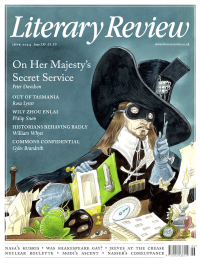Tanya Harrod
Lines in the Sand
A Shell in Time
By Lida Lopes Cardozo Kindersley & Els Bottema
Cardozo Kindersley 226pp £20
Once upon a time, two little girls grew up in Delft in the Netherlands. Both born in 1954, they were for a while ‘best’ friends. They drifted apart in their teens, met again as young women and finally came together with a bang when they both found they had breast cancer in their late forties. One of them is the letter cutter Lida Lopes Cardozo Kindersley, who runs the famous Cardozo Kindersley Workshop in Cambridge. The other is Els Bottema, once a social worker, now a potter living in Zutphen, northeast of Arnhem. They are the joint authors of A Shell in Time, a dialogic double autobiography.
Kindersley has form when it comes to these kinds of conversational publications. The Alphabetician and the Rabbi is made up of letters she exchanged with the British Reform rabbi Dan Cohn-Sherbok. Conversations about stone preparation and letter-cutting lead into discussions about faith and the various staging posts of life. In Words Made Stone, we find Kindersley in conversation with Marcus Waithe, an English scholar and admirer of John Ruskin, as they mull over what Waithe describes as ‘the traffic between mental composition and physical execution’.
A Shell in Time is a more personal book, with the potential to reach a far wider readership. It culminates in the creation by Kindersley and Bottema of the famous shell line that stretches down to the sea across the beach known as Shingle Street on the Suffolk coast. The

Sign Up to our newsletter
Receive free articles, highlights from the archive, news, details of prizes, and much more.@Lit_Review
Follow Literary Review on Twitter
Twitter Feed
It wasn’t until 1825 that Pepys’s diary became available for the first time. How it was eventually decrypted and published is a story of subterfuge and duplicity.
Kate Loveman tells the tale.
Kate Loveman - Publishing Pepys
Kate Loveman: Publishing Pepys
literaryreview.co.uk
Arthur Christopher Benson was a pillar of the Edwardian establishment. He was supremely well connected. As his newly published diaries reveal, he was also riotously indiscreet.
Piers Brendon compares Benson’s journals to others from the 20th century.
Piers Brendon - Land of Dopes & Tories
Piers Brendon: Land of Dopes & Tories - The Benson Diaries: Selections from the Diary of Arthur Christopher Benson by Eamon Duffy & Ronald Hyam (edd)
literaryreview.co.uk
Of the siblings Gwen and Augustus John, it is Augustus who has commanded most attention from collectors and connoisseurs.
Was he really the finer artist, asks Tanya Harrod, or is it time Gwen emerged from her brother’s shadow?
Tanya Harrod - Cut from the Same Canvas
Tanya Harrod: Cut from the Same Canvas - Artists, Siblings, Visionaries: The Lives and Loves of Gwen and Augustus John by Judith Mackrell
literaryreview.co.uk